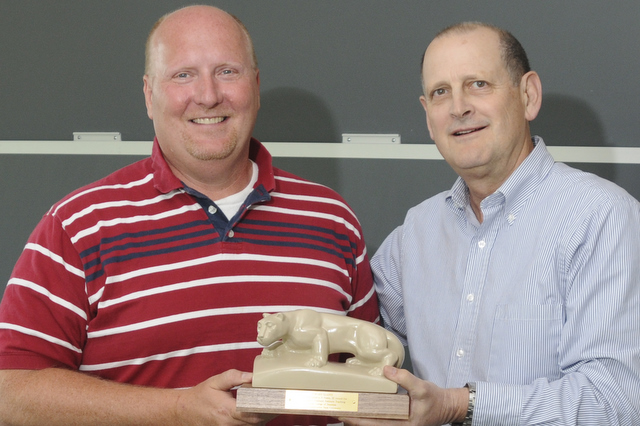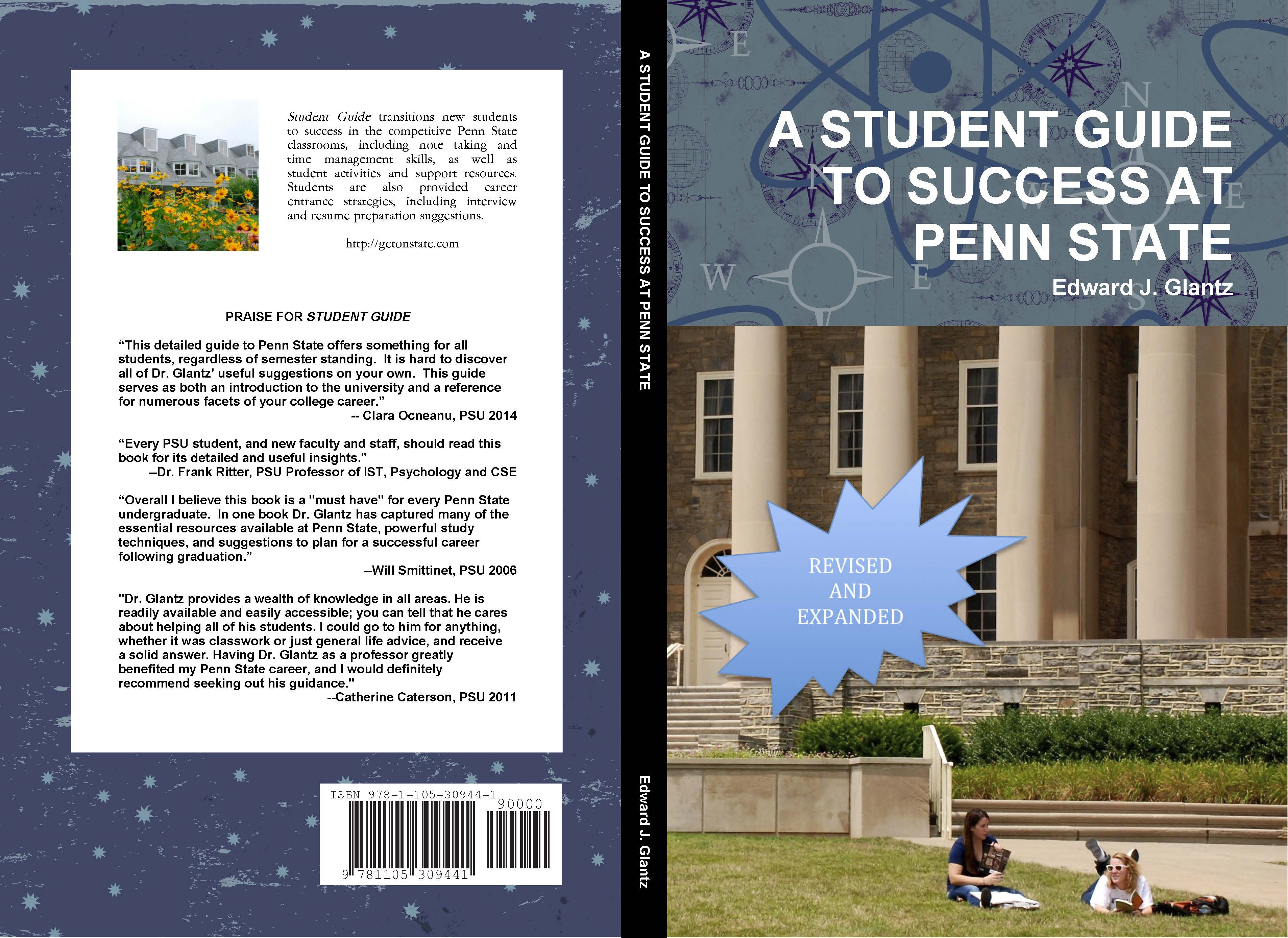In 2012 I wrote a first year seminar book titled A Student Guide to Success at Penn State (described below). Later that year I collaborated with IST’s Dr. Lisa Lenze to insert a chapter introducing the College of IST. This chapter (linked here as PDF: IST_Chapter) introduces the College of IST to new organizations and individuals.
Category Archives: Teaching
My AP Experience
As an undergraduate, it was quite rare to discover peers with AP credits earned by taking exams while in high school. Since then I am fascinated that students now earn more than just a few AP credits!
This may be changing, however, if Dartmouth College is a bellwether. Dartmouth recently announced they will no longer grant AP credit, citing concerns of protecting the eight-semester experience (http://www.dukechronicle.com/article/some-colleges-weigh-value-ap-credits). This comes at an interesting time when colleges are under pressure to accept a growing number of transfer students with credits from other institutions, as well as growth in MOOCs and other alternative educational experiences.

By the way, I would like to take this time to introduce Marion Bressler, and share my lone AP experience. Mrs. Bressler was a fascinating lecturer in AP History, and was able to mesmerize a large section of high school students for an entire year. I was not surprised to learn from her obituary that she was a national pioneer in the AP movement, worked with ETS as a consultant, and even taught Joe Paterno’s athletes.
I have tried to incorporate Mrs. Bressler’s sense of trust and mentoring with my students. From her I know that learning is a path, and not a race. She was never condescending or dismissive. She did more to prepare me for many years of college than any other high school experience. I am grateful that I had the chance to thank her a few years ago when our paths crossed. She lit up and fondly remembered her students, our time together, and what we had accomplished. She had every right to be proud of her time with her students. We are better for it.
We Need More “Classical” Arguments!
I see a strong connection between any communication, logic, or philosophy class you may have had (i.e., speech or writing), and this research class. What we wish to do is construct a convincing “argument” that will convince a particular audience to agree with our claim.
UNC has a nice article on “argument” (“expressing a point of view on a subject and supporting it with evidence”) that you may want to review.
It is my perception that the ability to construct classical arguments has become diffused since the time of Socrates. Humorist Stephen Colbert (below) even invented the term “Truthiness” to describe a “truth” that a person claims to know intuitively “from the gut” or because it “feels right” without regard to evidence, logic, intellectual examination, or facts [Retrieved from “http://en.wikipedia.org/w/index.php?title=Truthiness&oldid=492921182“].
I personally believe societal success requires more thoughtful development of beliefs and claims!
Dr. G.
| The Colbert Report | Mon – Thurs 11:30pm / 10:30c | |||
| The Word – Truthiness | ||||
|
||||
Reading–Not just the “what,” but the “how”
My first ebook platform was the Kindle app on an iPad. Dr. Pete Forster had recommended Marcus Luttrell’s Lone Survivor: The Eyewitness Account of Operation Redwing and the Lost Heroes of SEAL Team 10, describing events of posthumous Medal of Honor recipient and Penn State alumni, Lt. Michael Murphy. Since I am not a fan of reading long articles on a computer, I was skeptical of this experiment. To make the test even more difficult, I planned to begin reading the ebook in bright sunlight while attending a men’s slow-pitch softball game.
I was hooked immediately. By itself, Lone Survivor is a remarkable introduction to SEAL training in general, and the Operation Redwing tragedy in particular. I am sure I would have put up with any ebook challenge to finish this gripping story. However, unlike bulky computers, the ebook actually facilitated reading by enhancing reader control and flexibility. For example, I found I prefer a large font in white characters on a black background. This combination works well, I discovered, in both bright sunlight and dark rooms.
“What” to read has not been a challenge, but there are some strategic “how” issues emerging. For example, I enjoy collecting free Kindle classics, or an occasional Project Gutenberg book. I love knowing I can bring my entire library with me to the doctor’s office or on vacation.
I selected the Kindle version, since comments and highlights in hardcopies are difficult to retrieve. Kindle, however, allows readers to make and export notes and highlights.
Hardcopies are still needed, especially if I want to share them or include contents in a lesson plan. In these cases, I comply with Stanley and Danko’s[1] research that suggests beginning with a library copy. This was recently the case with Washington Post reporters Priest and Arkin’s Top Secret America. In just a few dozen pages, though, I realized I would need to purchase this book to make highlights and notes.
I selected the Kindle version, since comments and highlights in hardcopies are difficult to retrieve. Kindle, however, allows readers to make and export notes and highlights. They are automatically tracked at https://kindle.amazon.com/. In fact, you can keep your notes private, or make them public. You may also review public notes and highlights from other readers since Amazon lists “Highly Followed People” and “Books With the Most Public Notes.”
To read Former hacker Kevin Poulsen’s Kingpin: How One Hacker Took Over the Billion-Dollar Cybercrime Underground, I checked out the digital copy from our local library. The library-required iPad Overdrive App is a compromise, since it allows me to “check out” new books on an iPad, but not the ability to make notes. In this case, I will probably end up purchasing the book; I now know it will be necessary in lesson plans.
Some books are available in browsers with Internet access only, such as the “on line” books listed in the Penn State Library “Cat.” To click on these links, log in to the library before clicking on the online link. Google Books and the Google Books Project at Penn State are other browser options requiring Internet access.
So as you can see, the question now is not just what to read, but also how.
[1] Advice to borrow library books and not purchase, comes from researchers Stanley and Danko in The Millionaire Next Door
My First Faculty Senate Meeting!
My first University Senate meetings were Tuesday, September 9th. The curricular affairs (SCCA) committee met for approximately 1-1/2 hours in the morning, led by Chair John Hannan (Computer Science & Engineering). The full Senate met for approximately 3 hours in the afternoon, led by Senate Chair Ingrid Blood (Healthy & Human Development).
It was good to see Ingrid again – we first met when I began at University Park in the late 1990’s. Both John and Ingrid are very capable chairs for their respective groups. It is great to see such passion and enthusiasm from faculty for their work here at PSU.

Links
Dr. Glantz – 2008-2009 University Faculty Senator
Smeal faculty elected Dr. Glantz to serve as 2008-2009 faculty senator. The University Faculty Senate is the representative body of Penn State’s 5,500 full-time faculty at 23 Penn State campuses. Legislative authority pertains to the educational interests of the University and all educational matters that concern the faculties of more than one college. The Senate is also recognized by the University as an advisory and consultative body to the President matters that affect the attainment of the University’s educational objectives.
It is interesting to note that the Penn State University Faculty Senate met for the first time as a “representative legislative” body in 1921, replacing the prior general assembly approach to governance.

As a senator, Dr. Glantz will also serve on the Senate Committee on Curricular Affairs (SCCA). The SCCA reviews, evaluates, and approves (or rejects) all course and curriculum proposals including proposals to limit program enrollment submitted by the various departments and colleges.
Dr. Glantz joins other Smeal Senators including Norm Aggon, Jim Miles, Barbara Gray, Bin Ke, and Orie Barron.
(“Columns of Old Main” photo credit: Greg Grieco, 2002, http://imagearchive.psu.edu)
Dr. Glantz – Smeal’s 2008 Brand-Paiste Teaching Award Winner
It was very exciting to receive the Smeal College of Business 2008 Brand-Paiste Teaching award at a ceremony July 2, 2008, in the presence of students, faculty and family. The award was presented by Supply Chain & Information Systems department head, Dr. Gene Tyworth (pictured below). Each year, Smeal recognizes and rewards outstanding faculty, graduate assistants, and advisers through the Fred Brand Jr. and Dillwyn P. Paiste, III Awards.
 I am very grateful for the support and recognition from the wonderful students here at Smeal – the same students that make Smeal one of the best business schools in the world!
I am very grateful for the support and recognition from the wonderful students here at Smeal – the same students that make Smeal one of the best business schools in the world!
